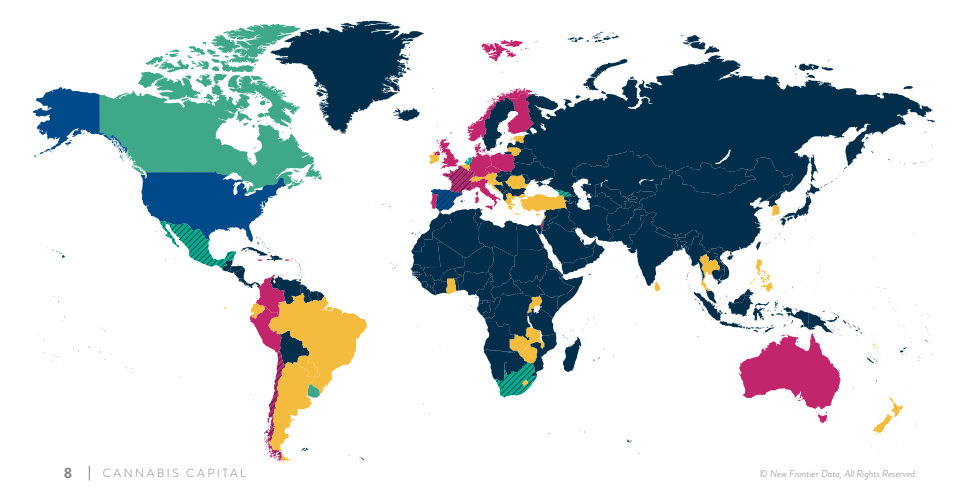The issue of cannabis legalization is a controversial topic all over the world, as people argue about the pros and cons of the plant. While offering several significant health benefits like stress/pain relief and therapeutic effects on people with various mental disorders, marijuana also possesses some risks like cannabinoid hyperemesis syndrome (CHS). At the same time, many still carry exaggerated prejudice towards marijuana, believing it should not be used on any occasion.
However, the world is heading forward: scientists overcome the bias and explore the real effects of marijuana, while governments of different countries pass bills for cannabis decriminalization or legalization. As of 2023, recreational cannabis is legalized in Canada, Georgia, Luxembourg, Malta, Mexico, South Africa, Thailand, and Uruguay, as well as 23 states, 3 territories, and the District of Columbia in the US and the Australian Capital Territory in Australia. More than 40 countries have legalized medical cannabis fully or partially.
The legalization of cannabis and its commercial distribution has created a white market for marijuana, establishing a new rapidly growing industry. Different legal regulations determine the operations, marketing, and advertising of cannabis companies. Naturally, such businesses encounter a lot more challenges than enterprises in other industries.
The metaverse and Web3 offer a set of tools that can help cannabis companies gracefully handle difficulties, increase their customer base, or grow their brand. Program-Ace, a metaverse development company, has already leveraged the metaverse for the cannabis industry, and we are glad to highlight the main things that can be useful for cannabis entrepreneurs.
The Overview of the Cannabis Industry
The cannabis industry is rapidly maturing, projected to hit the whopping number of $51.27bn in 2023, showing a 23.3% growth. By 2028, specialists predict this industry to reach $102.90bn in 2028. The United States which controls 73% of the global market, is an obvious leader, while Canada, Netherlands, Germany, and Thailand will follow.

The United States, where recreational usage is allowed in 23 states out of 50, observes the popularity growth of cannabis, as more than half of the population considers marijuana usage socially acceptable, and only 8% of Americans are against the legalization of cannabis.
The development of the cannabis industry shows a positive effect on the US economy: in 2021, the sector reported $25bn in sales and 428,000 jobs supported. Since 2014, the legal market of cannabis has generated $20bn in tax revenues for state and local governments.
Though the US remains the epicenter of the cannabis economy, a shift in Europe is expected, with Germany projected to dominate after the passage announcement of adult-use cannabis legalization. Consequently, we can expect significant changes in European drug policies to accelerate the market on the continent.
The Current Challenges of the Cannabis Industry
The cannabis industry, despite the rapid growth it shows, grapples with a multitude of challenges. From regulatory hurdles to market inconsistencies, businesses must navigate a complex environment to thrive. Let’s contemplate them together.
Regulatory disparities. One of the most significant challenges is the patchwork of regulations. While cannabis may be legal in some regions, it remains prohibited in others. This disparity complicates cross-border trade, investment, and expansion strategies.
Banking and financial restrictions. Many financial institutions remain hesitant to engage with cannabis businesses due to federal regulations, especially in places like the U.S. For example, Mastercard has recently demanded cannabis stores stop accepting their cards.
Stigma and public perception. Despite increasing acceptance, cannabis still faces societal stigmas. Misinformation and deeply rooted misconceptions can hinder consumer adoption and affect market growth.
Supply chain inconsistencies. Quality control across the cannabis supply chain can be inconsistent. From cultivation to retail, ensuring product consistency, safety, and potency remains a challenge, influencing consumer trust.
Taxation issues. In some regions, cannabis businesses face exorbitant tax rates, making it challenging to compete with the unregulated market. High taxation can inadvertently encourage black-market operations, undermining the legal industry's growth.
Limited research and development. Due to legal restrictions, there's been limited scientific research on cannabis, especially concerning its medicinal applications. This lack of comprehensive research impacts product development, marketing, and medical adoption.
Market saturation. As more businesses enter the cannabis space, companies face intense competition. Differentiating one's brand, ensuring customer loyalty, and maintaining profitability in a crowded market becomes increasingly difficult.
Evolving consumer preferences. As the market matures, consumer preferences shift. Staying ahead of these trends, whether it's the rise of edibles, vapes, or wellness products, requires agility and adaptability from cannabis companies.
While the cannabis industry's future holds immense promise, businesses must remain resilient, adaptive, and informed to harness the sector's full potential and survive in the complex business and legal environment.
Why Should the Cannabis Industry Embrace Web3?
Web3, the next evolution of the internet, heralds a decentralized and democratized digital environment. As the metaverse becomes the next frontier of online interaction and business, industries across the board stand to gain – and the cannabis sector is no exception, as the compelling benefits push businesses for exploration.
Trust and transparency
At its core, Web3 is powered by blockchain technology. This immutable and transparent ledger offers cannabis companies a chance to showcase their products' authenticity, source, and quality. For an industry that has faced skepticism, the transparency offered by Web3 could be instrumental in building trust with consumers.
Tokenized ecosystems
Web3 enables the creation of token economies. Cannabis companies can use this to reward customer loyalty, facilitate trade, or even fundraise for ventures through decentralized finance (DeFi) features. Tokens could represent special product access, discounts, or exclusive digital and physical experiences.
Virtual spaces and experience
As the metaverse expands, virtual cannabis lounges or experiences can be a unique way to engage consumers. Imagine attending a virtual cannabis education seminar or tasting event – this sort of immersive brand engagement was unthinkable in traditional webspace.
Tamper-proof supply chains
Blockchain's decentralized ledger can be used to track and verify the entire supply chain of cannabis products. Each step can be recorded from the seed to sale, ensuring that consumers get precisely what is promised, further building the industry's credibility.
Global reach and communities
Web3 can help overcome some of the geographical restrictions the cannabis industry faces. By establishing a strong presence in the metaverse, companies can reach global audiences and foster communities where enthusiasts can connect over shared interests.
Web3 doesn't just offer cannabis companies new tools – it provides an entirely new playground. With web3 capabilities in the hands, the cannabis industry can navigate the challenges of its unique position and unlock opportunities that extend beyond the physical world.
How Can Cannabis Companies Use the Metaverse?
The metaverse, often described as a collective virtual shared space, is not just a place for gaming or social networking — it's a burgeoning market with vast potential for industries, including cannabis. We gathered some of the best application examples cannabis companies might be interested in.
We believe that the metaverse opens a dimension of possibilities limited only by creativity. For cannabis companies willing to innovate and adapt, it provides a space to grow their brand, connect with consumers, and redefine the cannabis experience for the digital age.
Legal Aspect of Cannabis Metaverse
As cannabis brands explore the potential of the metaverse, they must navigate a complex web of regulations. The fusion of the metaverse's virtual realms and the unique legal landscape of the cannabis industry presents several considerations:
Jurisdictional ambiguities
The metaverse is accessible worldwide, making it challenging to pinpoint jurisdictional boundaries. Cannabis brands must be cJurisdictional ambiguities. The metaverse is accessible worldwide, making it challenging to pinpoint jurisdictional boundaries. Cannabis brands must be cautious in regions where the product is illegal. It's essential to use geofencing to restrict access based on location.Age verification
Just as with physical sales, brands need to ensure that metaverse participants interacting with cannabis-related content are of legal age. Advanced age verification tools and protocols should be implemented to prevent underage access.Marketing restrictions
Many jurisdictions have stringent marketing regulations for cannabis. In the metaverse, where immersive advertising can be highly influential, brands need to be wary of making health claims, targeting minors, or promoting excessive use.Intellectual property
The metaverse is ripe for IP infringements. Cannabis brands should protect their virtual assets, like branded spaces or products, and monitor the metaverse for unauthorized uses of their logos, designs, or other trademarked elements.Virtual transactions
If brands are considering selling real-world cannabis products through the metaverse, they must ensure transactions comply with financial regulations related to cannabis sales, which can vary significantly across jurisdictions.Data privacy
Interacting in the metaverse often requires users to share personal data. Cannabis companies must ensure they are compliant with data protection regulations, storing user information securely, and being transparent about how data is used.Consumer protections
Virtual goods, like tokenized loyalty rewards or digital assets, might be traded or purchased. Brands must ensure they offer clear terms of service and understand the potential liabilities associated with these digital goods.
While the metaverse offers tremendous opportunities for cannabis brands, it's a space fraught with legal intricacies. Brands must be proactive, seeking legal counsel familiar with the evolving digital landscape and cannabis regulations to ensure a smooth and compliant foray into the metaverse.
Cannaland: The Pioneer of the Cannabis Industry in the Web3

The rapid emergence of Web3, characterized by decentralized platforms and blockchain-enabled virtual worlds, has been the talk of the tech world. The metaverse, as we have come to understand it, is an expansive digital universe encompassing multiple interconnected realities. As industries seek to position themselves within this new ecosystem, Cannaland become the first vivid example of the metaverse offer for the cannabis industry.
Launching in late 2022, Cannaland emerged as the world's first dedicated cannabis community in the metaverse. Created by Cannaverse Technologies, Cannaland aims to provide a testing ground for advanced technologies, 3D graphics, and machine learning applications that are set to shape the new Web 3 experience.
Several innovative aspects of Cannaland position it uniquely in the metaverse. First, it serves as a birthplace for emerging cannabis brands. By providing a virtual platform, businesses worldwide can operate without traditional world boundaries, presenting unparalleled opportunities for the globalization of brands, and even allowing leading consumer brands an entrance into the cannabis market within the metaverse. Second, Cannaland presents its own cryptocurrency — the Cannaland Token (CNLT) to facilitate secure, transparent transactions.
While in the early stages of its development, Cannaland has proved the viability of the metaverse application for the cannabis industry. With further development of the global metaverse concept, we can expect the cannabis industry to expand its presence in the virtual world.
Program-Ace’s Weed Metaverse: Innovative Solution for Cannabis Companies

After thoroughly researching the current state of the cannabis industry, we acknowledge that cannabis companies face a lot of challenges nowadays. Entrepreneurs need to follow legislation and ensure compliance and, at the same time improve their brand image within the saturated highly-competitive industry. And don't forget about the bias that still applies to cannabis which pushes cannabis businesses to establish educational initiatives explaining the medical and therapeutic effects of marijuana.
Thankfully, Web3 has vast potential to bring changes. Harnessing the experience in the metaverse development, Program-Ace created a universe solution addressing the main challenges cannabis companies face – the Weed Metaverse.
Instead of a shared space like Cannaland controlled by others, our Weed Metaverse becomes your personal environment to represent your brand and engage with your audience. Built within the interactive metaverse environment, enhanced with Web3 capabilities, and tailored to the specifics of the cannabis market, our Weed Metaverse is an innovative tool for:
- revenue growth;
- cost optimization;
- ROI increase;
- brand engagement;
- customer acquisition & audience growth;
- educational impact.
We ensure that cannabis companies access this value through the set of comprehensive features.
1. Cannabis Farming Simulation Metaverse Game
Dive into an immersive cannabis farming simulator that allows businesses to amplify their brand visibility. This virtual platform offers a space for education on cannabis cultivation, facilitates R&D opportunities in a risk-free environment, and seamlessly integrates products into a dynamic marketplace, enhancing brand engagement in the cannabis sector.
2. Multiplayer Lounge Areas
Engage in a socially-rich digital space, tailored for business networking and collaboration. These lounge areas provide opportunities for NFT trading, brand exposure, and the creation of bespoke virtual experiences. They act as hubs for industry interaction, maximizing brand presence and fostering valuable connections.
3. Virtual Economy and Real-World Exchange
Merge the digital with the tangible by leveraging unique marketing campaigns. This feature offers innovative loyalty programs using virtual assets, bridging the gap between virtual goods and real-world benefits. It promotes brand loyalty, encourages repeat business, and creates synergies in the virtual marketplace, enhancing overall customer engagement.
We designed Weed Metaverse to be a go-to solution for cannabis businesses. If you want to be on the frontier of innovation or if you have been looking for an efficient way to elevate your cannabis brand, our metaverse is a viable option to consider.
Learn more about our cannabis industry-tailored offer.
How Will the Metaverse Impact the Future of the Cannabis Industry?
The fusion of the metaverse and the cannabis industry hints at a transformative future. As these two worlds collide, the cannabis sector can expect a reshaping of its operations, marketing strategies, and customer experiences. Considering the trends we currently observe in the market, we can predict the following outcomes in the near future.
Redefining retail. Virtual dispensaries in the metaverse can offer immersive shopping experiences, allowing customers to explore 3D representations of products, interact with knowledgeable avatars, and even experience simulated effects of various strains, all before making a purchase.
Expanded educational platforms. The metaverse can host dozens of interactive educational experiences. Augmented reality sessions explaining the cultivation process, virtual seminars on the medicinal benefits, or interactive courses on responsible consumption can engage users more profoundly than traditional methods.
Global community building. Geographic boundaries become less significant in the metaverse. Cannabis brands can foster global communities, offering enthusiasts a space to connect, share experiences, and champion the cannabis movement on an international scale.
New revenue avenues. The metaverse opens doors to diverse monetization strategies. From selling virtual cannabis-related goods to hosting paid virtual events, brands can tap into previously unexplored revenue streams.
Regulatory evolution. As the cannabis industry grows within the metaverse, it may catalyze a reevaluation of existing regulations, prompting authorities to adapt to the digital age.
The metaverse is poised to usher the cannabis industry into a new era, blending digital innovation with tangible products and experiences. The virtual dimension continues to evolve, and forward-thinking cannabis companies have a unique opportunity to lead the charge and redefine the industry's future.
Cooperate with Program-Ace, Your Reliable Partner to Enter the Metaverse
The metaverse is a complex ecosystem with its intricacies and pitfalls. Cannabis companies need to have strong technical support if they want to successfully enter the metaverse and access its value.
Program-Ace, a software development company with three decades of experience, has already dived into the promising metaverse application for the cannabis metaverse. We know what challenges you experience and what you need to incorporate to withstand competition. Contact us to learn more about our specialized offer for cannabis companies, and let’s conquer the metaverse power for your benefit together!






















